Search the Special Collections and Archives Portal
Search Results
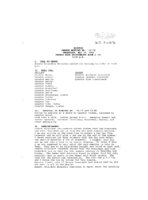
Meeting minutes for Consolidated Student Senate University of Nevada, Las Vegas, May 19, 1993
Date
1993-05-19
Archival Collection
Description
Includes meeting agenda and minutes, along with a National Student Exchange booklet. CSUN Session 23 Meeting Minutes and Agendas.
Text
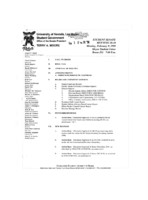
Meeting minutes for Consolidated Student Senate University of Nevada, Las Vegas, February 9, 1998
Date
1998-02-09
Archival Collection
Description
Includes meeting minutes.
Text
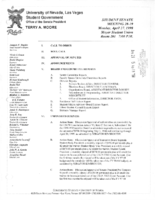
Meeting minutes for Consolidated Student Senate University of Nevada, Las Vegas, April 27, 1998
Date
1998-04-27
Archival Collection
Description
Includes meeting agenda and minutes.
Text
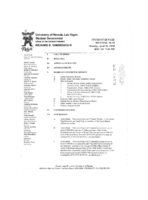
Meeting minutes for Consolidated Student Senate University of Nevada, Las Vegas, April 26, 1999
Date
1999-04-26
Archival Collection
Description
Includes meeting agenda and minutes, along with additional information about office supplies and advertisements. CSUN Session 29 Meeting Minutes and Agendas.
Text
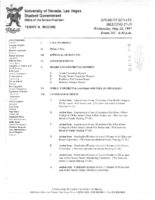
Meeting minutes for Consolidated Student Senate University of Nevada, Las Vegas, May 28, 1997
Date
1997-05-28
Archival Collection
Description
Includes meeting agenda and minutes and a letter.
Text
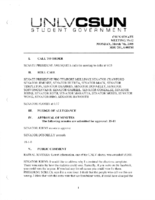
Meeting minutes for Consolidated Student Senate, University of Nevada, Las Vegas, March 07, 2005
Date
2005-03-07
Archival Collection
Description
Includes meeting minutes and agenda.
Text

Meeting minutes for Consolidated Student Senate, University of Nevada, Las Vegas, March 19, 2001
Date
2001-03-19
Archival Collection
Description
Includes meeting minutes and agenda, along with additional information about bylaws.
Text
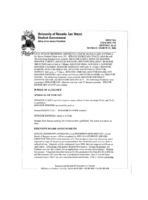
Meeting minutes for Consolidated Student Senate, University of Nevada, Las Vegas, March 22, 2004
Date
2004-03-22
Archival Collection
Description
Includes meeting minutes, along with additional information about letters.
Text
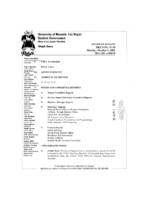
Meeting minutes for Consolidated Student Senate, University of Nevada, Las Vegas, October 01, 2001
Date
2001-10-01
Archival Collection
Description
Includes meeting minutes and agenda.
Text

Meeting minutes for Consolidated Student Senate, University of Nevada, Las Vegas, November 22, 1999
Date
1999-11-22
Archival Collection
Description
Includes meeting minutes and agenda.
Text
Pagination
Refine my results
Content Type
Creator or Contributor
Subject
Archival Collection
Digital Project
Resource Type
Year
Material Type
Place
Language
Records Classification
